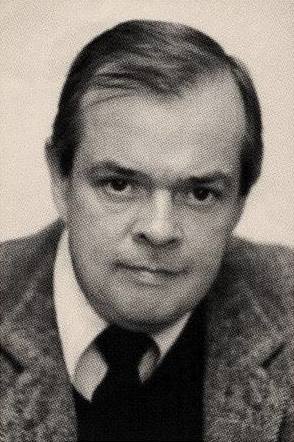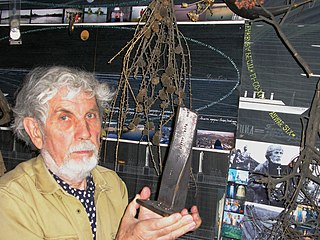Related Research Articles

The Holodomor, also known as the Ukrainian Famine, was a human-made famine in Soviet Ukraine from 1932 to 1933 that killed millions of Ukrainians. The Holodomor was part of the wider Soviet famine of 1930–1933 which affected the major grain-producing areas of the Soviet Union.

Lesya Ukrainka was one of Ukrainian literature's foremost writers, best known for her poems and plays. She was also an active political, civil, and feminist activist.

Sylvia Olga Fedoruk was a Canadian physicist, medical physicist, curler and the 17th lieutenant governor of Saskatchewan, from 1988 to 1994.

James E. Mace was an American historian, professor, and researcher of the Holodomor.
Holodomor denial is the claim that the Holodomor, a 1932–33 man-made famine that killed millions in Soviet Ukraine, did not occur or diminishing its scale and significance.
In 1932–1933, a man-made famine, known as the Holodomor, killed 3.3–5 million people in the Ukrainian Soviet Socialist Republic, included in a total of 5.5–8.7 million killed by the broader Soviet famine of 1930–1933. At least 3.3 million ethnic Ukrainians died as a result of the famine in the USSR. Scholars debate whether there was an intent to starve millions of Ukrainians to death or not.
The Holodomor was a 1932–33 man-made famine in Soviet Ukraine and adjacent Ukrainian-inhabited territories that killed millions of Ukrainians. Opinions and beliefs about the Holodomor vary widely among nations. It is considered a genocide by Ukraine, and Ukraine's Ministry of Foreign Affairs has lobbied for the famine to be considered a genocide internationally. By 2022, the Holodomor was recognized as a genocide by the parliaments of 23 countries and the European Parliament, and it is recognized as a part of the Soviet famine of 1932–1933 by Russia. As of June 2023, 35 countries recognise the Holodomor as a genocide.

Anatoly Ignashchenko was a prominent Ukrainian architect, specializing in the design of monuments and memorial complexes. Mr. Ignashchenko was a member (academician) of the Ukrainian Academy of Arts. In 1974, he was awarded with the Shevchenko National Prize for his work on the Lesya Ukrainka monument. In 2010, he became awarded as a People's Artist of Ukraine. Other honours received include Order of Prince Yaroslav the Wise (2006) and Order of the Badge of Honour (1982).

The National Museum of the Holodomor-Genocide, formerly known as the Memorial in Commemoration of the Holodomor-Genocide in Ukraine, is Ukraine's national museum and a centre devoted to the victims of the Holodomor of 1932–1933, a man-made famine that killed millions in Ukraine. The museum was opened on the day of the 75th anniversary of the Holodomor in 2008. It gained the status of a national museum in 2010. The museum is located on the Pechersk Hills on the right bank of the Dnieper River in Kyiv, adjacent to the Kyiv Pechersk Lavra.

The Harvest of Sorrow: Soviet Collectivization and the Terror-Famine is a 1986 book by British historian Robert Conquest published by the Oxford University Press. It was written with the assistance of historian James Mace, a junior fellow at the Harvard Ukrainian Research Institute, who started doing research for the book following the advice of the director of the institute. Conquest wrote the book in order "to register in the public consciousness of the West a knowledge of and feeling for major events, involving millions of people and millions of deaths, which took place within living memory."
Holodomor: Voices of Survivors is a 2015 Canadian short documentary film by filmmaker Ariadna Ochrymovych about the 1932–33 Holodomor famine in Soviet Ukraine. It documents oral history from Ukrainian Canadian survivors of the Holodomor, which is recognized by Ukraine, Canada and 28 other countries as of 2023 as a genocide of the Ukrainian people carried out by the Soviet Union under Joseph Stalin. Ochrymovych conducted and filmed over 100 interviews across Canada.
The 2018–19 season was the first season in the top Ukrainian football league for FC Arsenal Kyiv since its reformation in 2014. Arsenal competed in the Premier League and the Ukrainian Cup.
Vadym Hetman is a Ukrainian footballer who played as a defender.

Mystetskyi Arsenal National Art and Culture Museum Complex, also known as Mystetskyi Arsenal — is Ukraine's flagship public cultural institution, a museum and art exhibition complex located at 10–12 Lavrska Street, in Kyiv, Ukraine.

Genocide recognition politics are efforts to have a certain event (re)interpreted as a "genocide" or officially designated as such. Such efforts may occur regardless of whether the event meets the definition of genocide laid out in the 1948 Genocide Convention.

The International Arsenal Book Festival takes place annually in spring in Kyiv, Ukraine. It is a nationwide event founded by Mystetskyi Arsenal and was first held from May 28 to June 1, 2011, being curated by Olha Zhuk.

Halyna Hai was a Ukrainian poet and writer. She studied at the Institute of Journalism at Taras Shevchenko National University of Kyiv and graduated in 1982.

Holodomor Memorial Day or Holodomor Remembrance Day is an annual commemoration of the victims of the Holodomor, the 1932–33 man-made famine that killed millions in Ukraine, falling on the fourth Saturday of November. The day is also an official annual commemoration in Canada, and observed by Ukrainian diaspora communities in other countries.

Valentina Kuryliw is a historian and educator specializing in the Ukrainian Holodomor genocide of 1932–1933. Now retired, she served as the Department Head of History and Social Sciences for the Toronto District School Board with over 35 years of teaching experience. She is a methodologist, worked with the Ontario Institute for Studies in Education (OISE) at the University of Toronto training young history, law and sociology teachers and evaluating their achievements. She has also travelled extensively throughout Ukraine teaching teachers about human rights, critical thinking skills and the Holodomor in many of its regions since 1993; "Every year Valentina Kuryliw comes to Ukraine – a Canadian of Ukrainian descent, a methodological teacher, a history specialist from Toronto. She conducts courses in the summer in Lviv, Odesa, Ternopil, Lutsk, Khmelnytsky, Donetsk, Kharkiv and thus shows Ukrainian history teachers that teaching can be different. Ms. Valentina has made an invaluable contribution to the development of Ukrainian methodological thought." She taught the history of Ukraine at the Tsiopa Palijiw Ukrainian School Toronto where she was assistant director. From 2009, she is the chair of the National Holodomor Education Committee. of the Ukrainian Canadian Congress; from 2013, the Director of Education of the Holodomor Research and Education Consortium at the Canadian Institute of Ukrainian Studies, University of Alberta ; from 2009, she is a member of the Board of the Ukrainian Canadian Research and Documentation Centre (Toronto). She is a permanent member of the Ontario History and Social Studies Teacher's Association (OHASSTA).
References
- ↑ "Lesia Maruschak". The PhotoGallery. Retrieved 2020-08-14.
- 1 2 "Street raises $10,000 to find cure for blood cancer". Brampton Guardian . Retrieved 2021-07-13.
- ↑ "World's most famous exhibit on Holodomor on display in Kyiv (Photo)". Ukrainian Independent Information Agency . Retrieved 2021-07-13.
- 1 2 "Ms. Lesia Maruschak". Governor General of Canada . Retrieved 2021-06-24.
- ↑ "Lesia Maruschak - Maria". Landskrona Foto. Retrieved 2021-06-24.
- 1 2 3 "You must remember this: Landskrona festival's most memorable shots – in pictures". The Guardian. 15 September 2020. ISSN 0261-3077 . Retrieved 2021-06-24.
- ↑ "About". Lesia Maruschak. Retrieved 2020-08-14.
- 1 2 "Maria Lesia Maruschak". yogurtmagazine.com. Retrieved 2021-06-24.
- ↑ "Media Advisory: Governor General to Present Caring Canadian Award to 46 Volunteers". Yahoo! Finance . 4 April 2014. Retrieved 2021-07-13.
- 1 2 Vogue.ua (23 May 2019). "«Книжный Арсенал» назвал самую красивую книгу 2019 года". Vogue Ukraine . Retrieved 2021-06-24.
- ↑ ""Книжковий Арсенал-2019": назвали найкрасивішу книжку року". 5 Kanal (Ukraine) . Retrieved 2021-06-24.
- ↑ "Maria wins top honour at International Book Arsenal Festival in Kyiv - News - Ukrainian World Congress". Ukrainian World Congress . Retrieved 2020-08-14.
- ↑ "Recently". Maine Media Workshops . Retrieved 2020-08-14.
- ↑ ""Maria": The Most Famous Exhibition about the Holodomor Is in Ukraine for the First Time". National Museum of the Holodomor-Genocide . Retrieved 2021-06-24.
- ↑ "Lesia Maruschak : Project Maria". The Eye of Photography Magazine. 29 January 2021. Retrieved 2021-07-12.